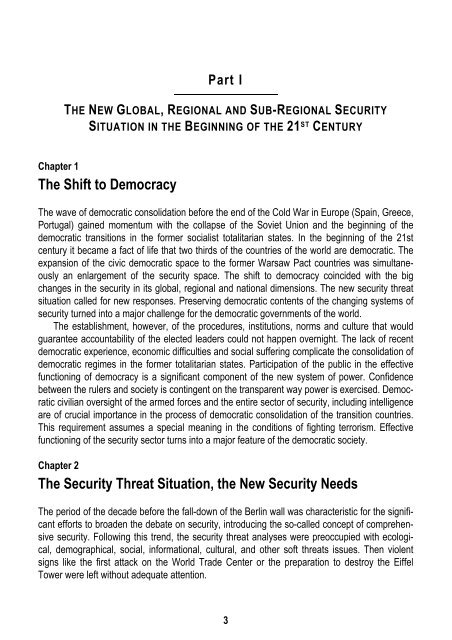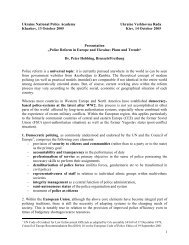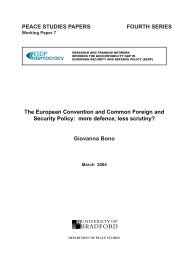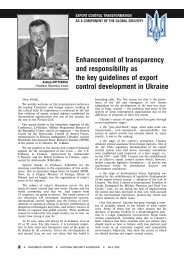Civil-Military Relations and Democratic Control of the Security Sector
Civil-Military Relations and Democratic Control of the Security Sector
Civil-Military Relations and Democratic Control of the Security Sector
Create successful ePaper yourself
Turn your PDF publications into a flip-book with our unique Google optimized e-Paper software.
Part I<br />
THE NEW GLOBAL, REGIONAL AND SUB-REGIONAL SECURITY<br />
SITUATION IN THE BEGINNING OF THE 21 ST CENTURY<br />
Chapter 1<br />
The Shift to Democracy<br />
The wave <strong>of</strong> democratic consolidation before <strong>the</strong> end <strong>of</strong> <strong>the</strong> Cold War in Europe (Spain, Greece,<br />
Portugal) gained momentum with <strong>the</strong> collapse <strong>of</strong> <strong>the</strong> Soviet Union <strong>and</strong> <strong>the</strong> beginning <strong>of</strong> <strong>the</strong><br />
democratic transitions in <strong>the</strong> former socialist totalitarian states. In <strong>the</strong> beginning <strong>of</strong> <strong>the</strong> 21st<br />
century it became a fact <strong>of</strong> life that two thirds <strong>of</strong> <strong>the</strong> countries <strong>of</strong> <strong>the</strong> world are democratic. The<br />
expansion <strong>of</strong> <strong>the</strong> civic democratic space to <strong>the</strong> former Warsaw Pact countries was simultaneously<br />
an enlargement <strong>of</strong> <strong>the</strong> security space. The shift to democracy coincided with <strong>the</strong> big<br />
changes in <strong>the</strong> security in its global, regional <strong>and</strong> national dimensions. The new security threat<br />
situation called for new responses. Preserving democratic contents <strong>of</strong> <strong>the</strong> changing systems <strong>of</strong><br />
security turned into a major challenge for <strong>the</strong> democratic governments <strong>of</strong> <strong>the</strong> world.<br />
The establishment, however, <strong>of</strong> <strong>the</strong> procedures, institutions, norms <strong>and</strong> culture that would<br />
guarantee accountability <strong>of</strong> <strong>the</strong> elected leaders could not happen overnight. The lack <strong>of</strong> recent<br />
democratic experience, economic difficulties <strong>and</strong> social suffering complicate <strong>the</strong> consolidation <strong>of</strong><br />
democratic regimes in <strong>the</strong> former totalitarian states. Participation <strong>of</strong> <strong>the</strong> public in <strong>the</strong> effective<br />
functioning <strong>of</strong> democracy is a significant component <strong>of</strong> <strong>the</strong> new system <strong>of</strong> power. Confidence<br />
between <strong>the</strong> rulers <strong>and</strong> society is contingent on <strong>the</strong> transparent way power is exercised. <strong>Democratic</strong><br />
civilian oversight <strong>of</strong> <strong>the</strong> armed forces <strong>and</strong> <strong>the</strong> entire sector <strong>of</strong> security, including intelligence<br />
are <strong>of</strong> crucial importance in <strong>the</strong> process <strong>of</strong> democratic consolidation <strong>of</strong> <strong>the</strong> transition countries.<br />
This requirement assumes a special meaning in <strong>the</strong> conditions <strong>of</strong> fighting terrorism. Effective<br />
functioning <strong>of</strong> <strong>the</strong> security sector turns into a major feature <strong>of</strong> <strong>the</strong> democratic society.<br />
Chapter 2<br />
The <strong>Security</strong> Threat Situation, <strong>the</strong> New <strong>Security</strong> Needs<br />
The period <strong>of</strong> <strong>the</strong> decade before <strong>the</strong> fall-down <strong>of</strong> <strong>the</strong> Berlin wall was characteristic for <strong>the</strong> significant<br />
efforts to broaden <strong>the</strong> debate on security, introducing <strong>the</strong> so-called concept <strong>of</strong> comprehensive<br />
security. Following this trend, <strong>the</strong> security threat analyses were preoccupied with ecological,<br />
demographical, social, informational, cultural, <strong>and</strong> o<strong>the</strong>r s<strong>of</strong>t threats issues. Then violent<br />
signs like <strong>the</strong> first attack on <strong>the</strong> World Trade Center or <strong>the</strong> preparation to destroy <strong>the</strong> Eiffel<br />
Tower were left without adequate attention.<br />
3

















